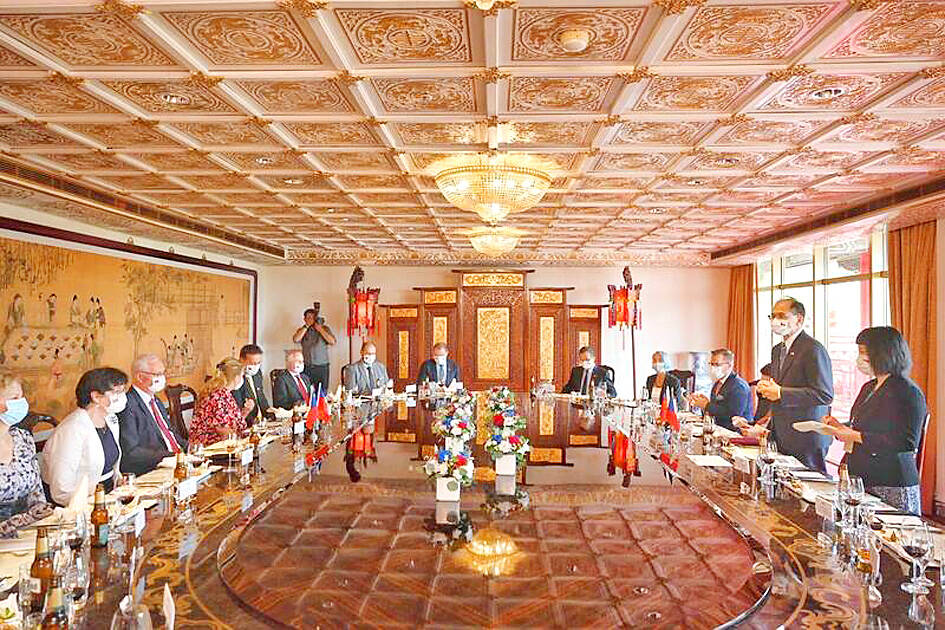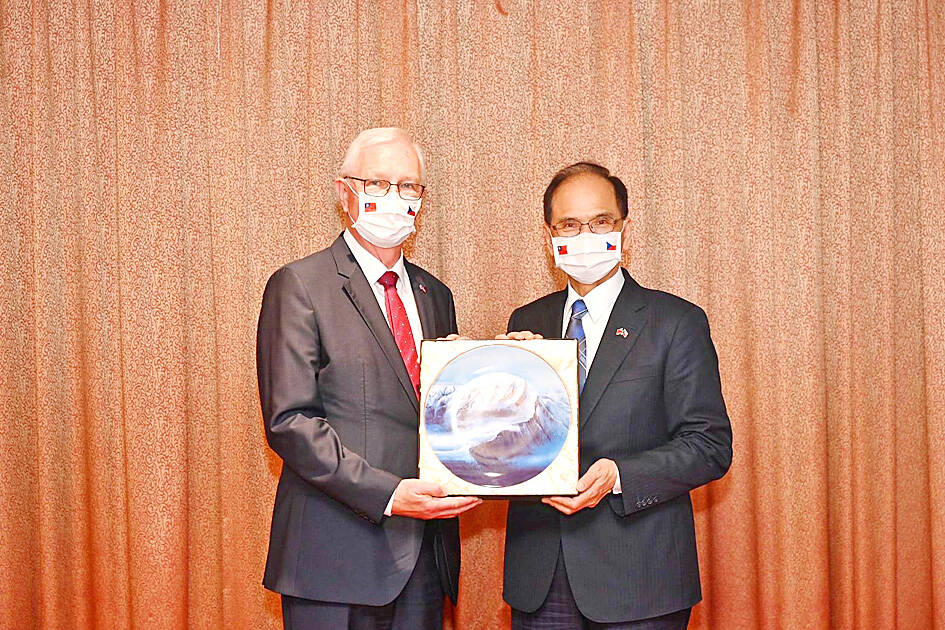The Czech Republic’s commitment to democracy and defense of Ukraine are deserving of admiration, Legislative Speaker You Si-kun (游錫堃) said yesterday while receiving a delegation led by Czech Senator Jiri Drahos in Taipei.
Drahos, who chairs the Czech Senate’s Committee on Education, Science, Culture, Human Rights and Petitions, and 12 other representatives arrived in Taiwan on Sunday for a six-day visit.
Addressing a reception for the delegation at the Grand Hotel yesterday afternoon, You opened by thanking the Czech s for welcoming him and other Taiwanese lawmakers when they visited the European nation in July.

Photo courtesy of the Legislative Yuan
He also praised the Czech Republic as a democratic leader in the region, whose peaceful 1989 Velvet Revolution instigated a wave of democratization across central and eastern Europe.
The late Czech president Vaclav Havel — the first to be elected democratically after the fall of communism in the nation — had the foresight to recognize that the totalitarian nature of communism is unsustainable, You said.
Yet over the past few years, democracy has been losing ground, he said, pointing to Chinese and Russian expansionism, and military rule in Afghanistan and Myanmar.

Photo courtesy of the Legislative Yuan
The Czech Republic ranks 10th in the world in terms of monetary aid to Ukraine — seventh as a percentage of GDP — and sixth in terms of military aid, You said, citing data from Germany’s Kiel Institute for the World Economy.
The nation’s defense of Ukraine in keeping with Havel’s spirit is worthy of admiration, he added.
In his address, Drahos said that although he only arrived the day before, it already feels like home.
The Czech Republic will continue to push for Taiwan’s involvement in international organizations such as the WHO and International Civil Aviation Organization, he said.
Drahos also expressed the hope of establishing direct flights between the two nations to make travel more convenient.
The delegation also includes Czech Academy of Sciences president Eva Zazimalova; Michal Lukes, general director of the National Museum in Prague; Roman Hvezda, director of the ELI Beamlines facility, an international laser research center; and officials from the fields of education, science and technology, as well as experts in epidemic prevention and information security.
Drahos had originally planned to visit Taiwan in October 2020, but postponed the trip due to the COVID-19 pandemic.
Additional reporting by CNA

AGING: As of last month, people aged 65 or older accounted for 20.06 percent of the total population and the number of couples who got married fell by 18,685 from 2024 Taiwan has surpassed South Korea as the country least willing to have children, with an annual crude birthrate of 4.62 per 1,000 people, Ministry of the Interior data showed yesterday. The nation was previously ranked the second-lowest country in terms of total fertility rate, or the average number of children a woman has in her lifetime. However, South Korea’s fertility rate began to recover from 2023, with total fertility rate rising from 0.72 and estimated to reach 0.82 to 0.85 by last year, and the crude birthrate projected at 6.7 per 1,000 people. Japan’s crude birthrate was projected to fall below six,

Conflict with Taiwan could leave China with “massive economic disruption, catastrophic military losses, significant social unrest, and devastating sanctions,” a US think tank said in a report released on Monday. The German Marshall Fund released a report titled If China Attacks Taiwan: The Consequences for China of “Minor Conflict” and “Major War” Scenarios. The report details the “massive” economic, military, social and international costs to China in the event of a minor conflict or major war with Taiwan, estimating that the Chinese People’s Liberation Army (PLA) could sustain losses of more than half of its active-duty ground forces, including 100,000 troops. Understanding Chinese

US President Donald Trump in an interview with the New York Times published on Thursday said that “it’s up to” Chinese President Xi Jinping (習近平) what China does on Taiwan, but that he would be “very unhappy” with a change in the “status quo.” “He [Xi] considers it to be a part of China, and that’s up to him what he’s going to be doing, but I’ve expressed to him that I would be very unhappy if he did that, and I don’t think he’ll do that. I hope he doesn’t do that,” Trump said. Trump made the comments in the context

SELF-DEFENSE: Tokyo has accelerated its spending goal and its defense minister said the nation needs to discuss whether it should develop nuclear-powered submarines China is ramping up objections to what it sees as Japan’s desire to acquire nuclear weapons, despite Tokyo’s longstanding renunciation of such arms, deepening another fissure in the two neighbors’ increasingly tense ties. In what appears to be a concerted effort, China’s foreign and defense ministries issued statements on Thursday condemning alleged remilitarism efforts by Tokyo. The remarks came as two of the country’s top think tanks jointly issued a 29-page report framing actions by “right-wing forces” in Japan as posing a “serious threat” to world peace. While that report did not define “right-wing forces,” the Chinese Ministry of Foreign Affairs was